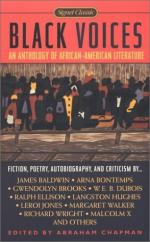|
This section contains 1,141 words (approx. 3 pages at 400 words per page) |

|
In the following excerpt, literary critic Cummings offers an overview of the stylistic evolution of Brooks's poetry.
Critics, white and black, argue over the racial politics of Brooks's early and later work. In the first stage of her career, Gwendolyn Brooks's poetry was praised by a largely white critical establishment for its formal virtuosity, its verbal complexity, and its "transcendence" of racial themes. In the sixties and seventies, however, many African American critics admired and focused on Brooks's welcome treatment of racial themes, violence, militancy, and the new Black Aesthetic. These critical viewpoints are much less segregated now, though as late as 2003, in a critical edition devoted mainly to her later work, Harold Bloom admitted his preference for Brooks's early work, its "wry turn upon the universal" and "imaginatively rich … enigmas."
A recording of Gwendolyn Brooks reading her poetry is included in Poetry Speaks: Hear Great Poets...
|
This section contains 1,141 words (approx. 3 pages at 400 words per page) |

|




